“Jurassic World: Dominion” Co-Writer Emily Carmichael on Crafting the Most Dino-Packed Epic of Them All
Five billion dollars into the dinosaur cinematic universe launched 19 years ago by Steven Spielberg, Laura Dern, Sam Neill, and Jeff Goldblum, the Jurassic franchise comes to an end — at least for now — with the Friday [June 10] release of Jurassic World: Dominion. Sixth in the series of popcorn spectacles famed for VFX recreations of prehistoric “apex predators,” Dominion sees legacy characters from the original trilogy joining forces with Jurassic World stars Bryce Dallas Howard and Chris Pratt on a quest to save the world from ecological catastrophe.
Co-authoring Jurassic World: Dominion with writer-director Colin Trevorrow is Emily Carmichael. A Harvard and NYU film school graduate, Carmichael caught Trevorrow’s attention in 2016 with her Sundance short film Hunter and Swann Discuss Their Meeting. She then impressed Jurassic godfather Spielberg with her sci-fi spec script Eon and in 2018, co-wrote her first produced feature Pacific Rim: Uprising. Along the way, the industrious writer-director created seven more short films, two unproduced studio features, and a retro video game-inspired animation series The Adventures of Ledo and Ix. “The idea that you will make your first short film and it will be brilliant and you can make a feature off of that is super unrealistic,” Carmichael says. “You’re going to have to take a lot of swings.”
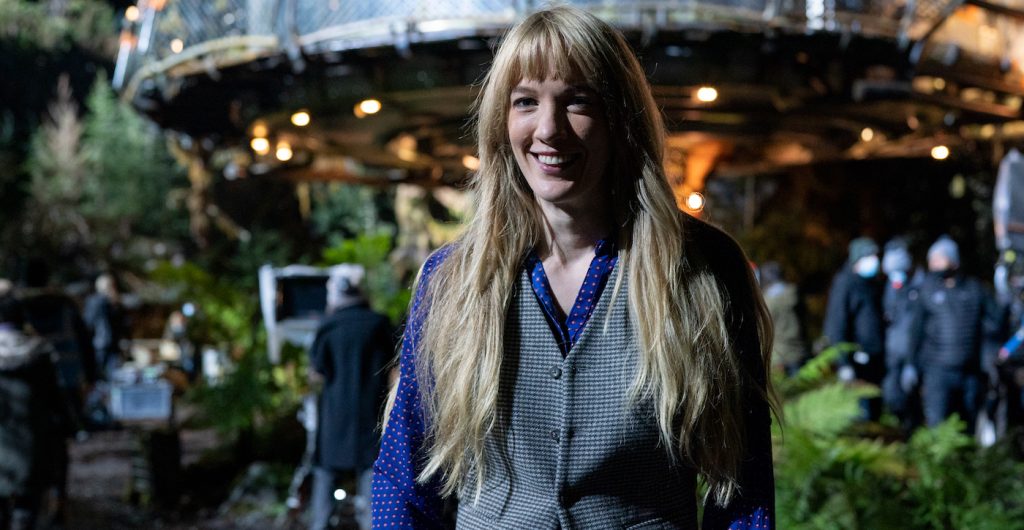
Carmichael checked in from Los Angeles to praise Malta, defend the virtues of exposition and explain why she didn’t get nervous pitching her vision Jurassic World: Dominion to Steven Spielberg
Congratulations on wrangling several dozen dinosaurs plus a giant cast of human actors into a single feature-length summer movie. Traditionally, a big Hollywood movie would probably just have one hero.
Yep.
By my count, Jurassic World Dominion has seven!
And that was a big challenge. We knew the legacy cast wanted to shine and we wanted our new characters to stand on their own in roles that could be unforgettable career turns for those actors. They’re all getting to do cool sh*t, so if the only criticism of the movie is “Too many heroes,” I’ll take it. The fact that we have this extremely dominant story form where it’s like, “White man saves the world and then kisses a skinny white lady – this is how real change in history happens.” That’s not how anything happens! It’s utterly false to the true nature of our species which is that we exist on the planet because we cooperate, and when we don’t cooperate, we die.
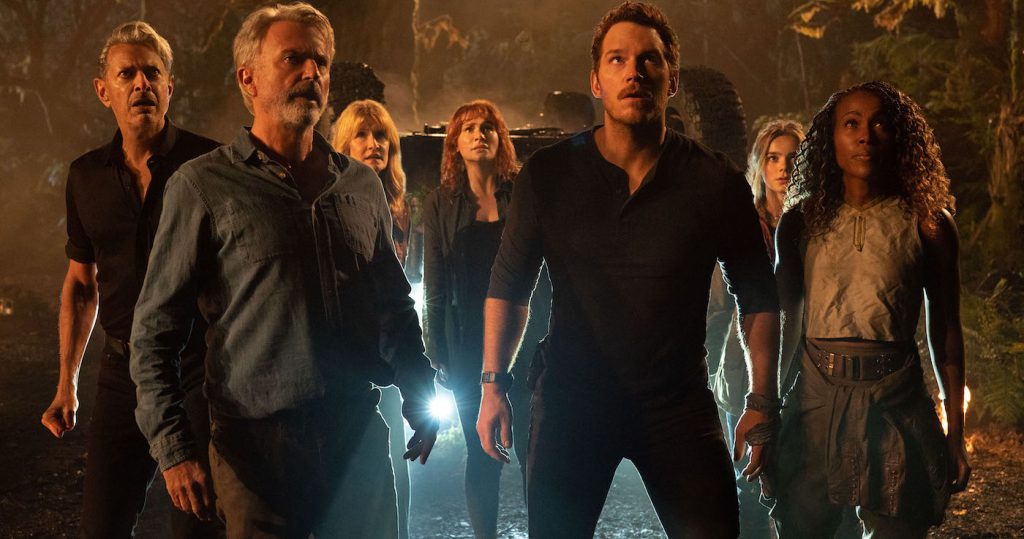
Given the size of the cast, how did you and Colin design the architecture of the story when it came to deciding how much weight to give each character or storyline? It must have been a huge balancing act.
A huge balancing act is right. One of the rules Colin and I always talked about is that we don’t want the audience to feel like they’re being ripped away from something they want to see more of or forced to watch something they want to see less. We want to be flowing with the audience and moving the audience’s attention where we want it to go. Watching the movie now, it’s easy to forget how many times it was like, “Oh man, now we’re cutting back to Laura [Dern] and Jeff [Goldblum] and they’re still just talking in this room, and they need to say this stuff so what are we going to do? Can we explode the room? Can we put some dinosaurs in there? [laughing].
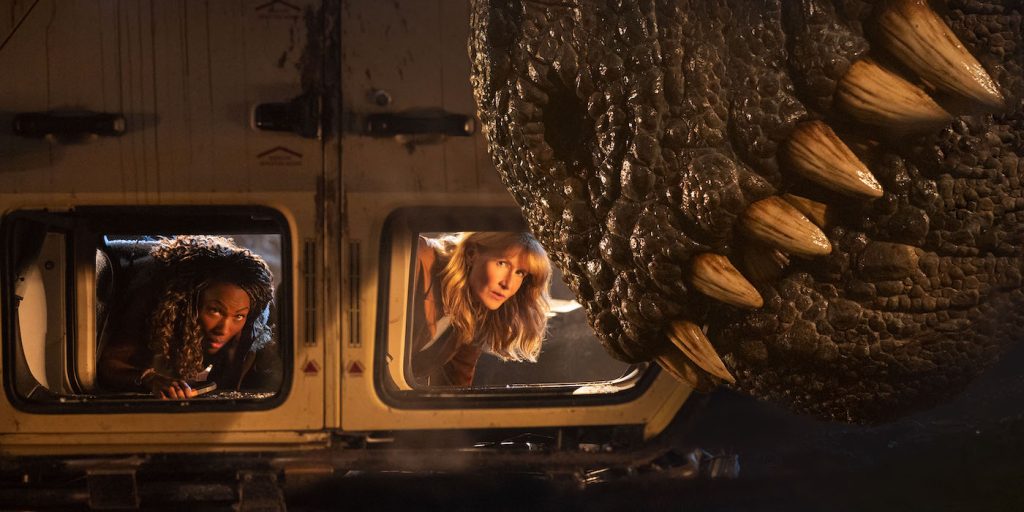
[SPOILER ALERT] You certainly put plenty of dinosaurs on the island of Malta, where Bryce Dallas Howard’s character Claire leaps from building to building and Chris Pratt’s Owen roars down narrow streets on his motorcycle after getting entangled in this wild black market for endangered species.
[Gasping] Malta! I love that. It’s my favorite sequence of the movie. If I’m like 80 and my boyfriend’s grandkids are watching Jurassic World Dominion on TV and I shuffle into the doorway, if it’s the Malta sequence I’d stay and watch just because it’s so cool. Obviously, we’re ripping a page from the [Jason] Bourne playbook and the Bond playbook but we love the characters so much as they are hauling ass through this old European city that’s overrun by dinosaurs. The action’s just so fun.
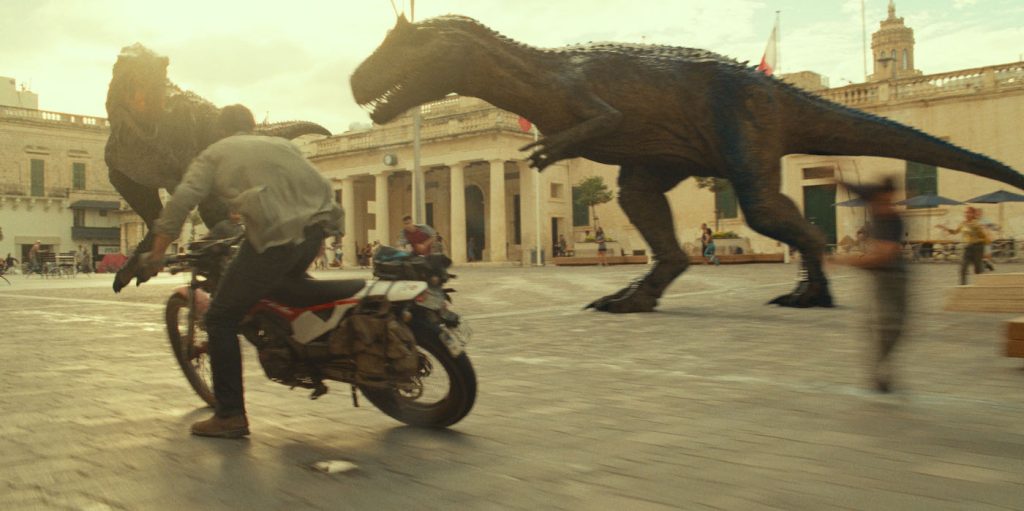
Colin Trevorrow knows the Jurassic World universe inside and out, having launched the trilogy in 2015. What did he want you to bring to the table?
He brought me to the table to write the movie with him, no reason more and no reason less. If you hear somebody say that I was here to write the female characters, they are lying. If you hear somebody say I was here to do the relationships or dialogue pass, they are wrong.
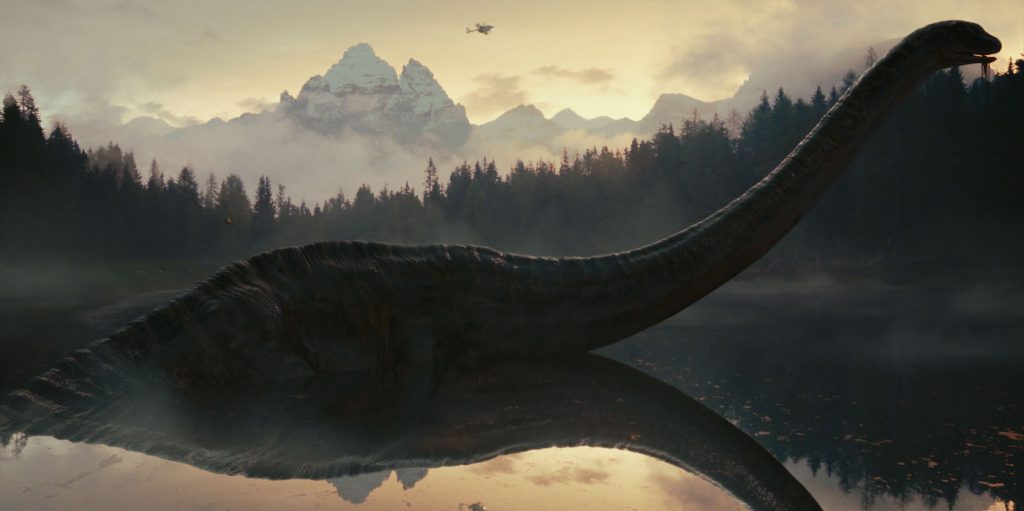
So, writing the movie with Colin – – what did that entail?
Over a period of months, we had meetings in Santa Monica and in France. The early story conferences were stuff like [excited voice] “What if they bungee jump out of a plane while raptors are chasing them!” The later story conferences are like [calm voice] “Okay, we have bungee cords coming in at the bottom of act two and they seem to be gone by the time of act three so can we discuss how we’re going to manage that?” It goes from pie-in-the-sky fun and excitement to dealing with technical nuts and bolts.
From those story sessions those meetings you guys produced an outline, and then what?
I wrote the first pass of the script, except for one action sequence that Colin wanted to write. He was usually in England, I was here. I’d send my pass to him on DropBox, he’d send his version back to me. I’m realizing only now that I could have just said at some point: “Oh your revisions are great” but every time Colin sent the pages back to me I felt like, “I have to contribute more!” So I’d give my take on his take on my take on his take many times ad infinitum.
[SPOILER ALERT] Certain story elements were already in place when you started, right?
From Colin’s work with [Jurassic World co-writer] Derek [Connolly], I knew that two adventures collide. I knew that Ellie would be set into action by an ecological mystery and that Claire and Owen were going to be set into action by the kidnapping of their daughter. We knew those storylines would dip and crash with a lot of great action set pieces around the world before bringing everybody to BioSyn for act three when the characters have to escape this deadly dinosaur facility. The question was, do they need to be unified by more than that? And the answer really came from Steven. He was like, the two storylines – – the locusts, and [teenager] Maisie [Isabella Sermon] and [baby dinosaur] Beta — have to be connected. I lost a lot of sleep coming up with a scientific reason to unite all these characters. In my personal opinion, it could have been that both groups happened to be in the wrong dinosaur place at the wrong time, but a lot of other people went the other way and Spielberg was one of those people: “No. It can’t just be a random unlucky Thursday for both sets of characters. They have to be there for the same reason.”
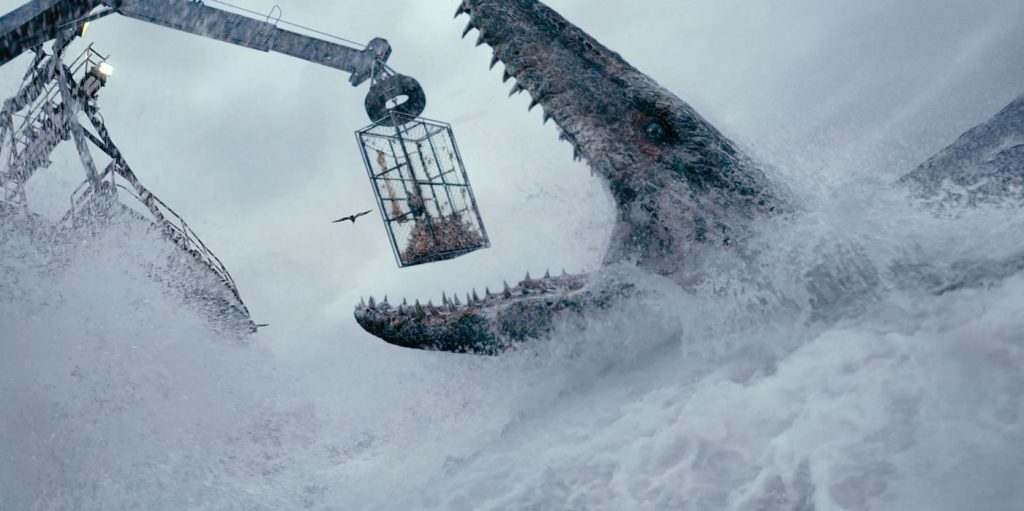
Sequels often generate talk about “fan service” but “actor service” must be just important because you need to write roles that are interesting enough to attract the stars you have in mind?
When have a cast of revered actors, you’ve got to create drama and tension without anybody slipping on a banana peel. How can every character be awesome in a way that suits them without throwing anybody else under the bus? That was delicate and it took a lot of work. Getting the actors to say yes — I still remember Colin texting me, “They’re all in.”
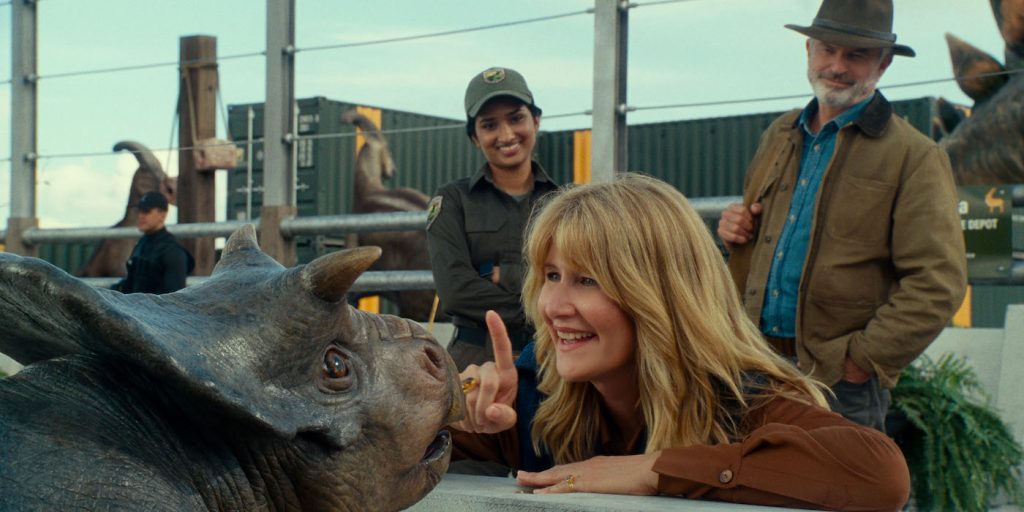
You didn’t shy away from “exposition” when it’s essential to understanding what’s going on in the story.
Dude, I’m so happy to hear you say that because that is exactly my whole thing as a screenwriter: just the fact that a character says information is not inherently bad. Some people get too precious about it. But ideally, a good exposition scene is emotional, like when Maisie is getting information from Dr. Wu [BD Wolng] about her mom. It’s not just information, it’s incredibly emotional information that changes the way she thinks about everything. And the other good exposition is when it makes you say “Oh sh*t.” Like, “There’s dinosaurs hiding over there.” “Oh sh*t.”
Being on a first-name basis with Steven Spielberg, who of course directed Jurassic Park in 1993, must be exciting. How did you meet?
The first time, I went up to him at a screening of Lincoln in New York, and I was like “Mr. Spielberg I’m a writer-director.” He said, “Oh how nice, now we’re going in to see Lincoln.” But the Jurassic interaction was this epic meeting at a stage when our outline was pretty exact. We’d practiced it. We’d pitched [Universal Pictures chairman] Donna [Langley] and [producer] Pat [Crowley]. They were like “We love it!” We color-coded our outline red and blue for the parts I would say and the parts Colin would say.
Were you nervous?
Honestly, I was less nervous than I would be in other circumstances because we have the job, and we’re already writing the movie. If Steven hated it and raised a bunch of objections, we would have dealt with it.
As it turned out, Spielberg liked your pitch?
I think he told us there needed to be more security guards in one of the action pieces. And then he showed us footage of West Side Story, and then we recorded video on a 3-D camera that he sent to [Lucasfilm President] Kathleen Kennedy. It was crazy, just hanging out.
In terms of tone, Jurassic World: Dominion has moments of humor here and there but for the most part, it feels pretty serious compared to earlier installments.
I had funny ideas about things that could happen but they’re not in the movie because Colin’s like, “No, this is a serious scene.” Whereas I’m not that kind of person. For me, there’s literally no upper limit on how many jokes you can have.
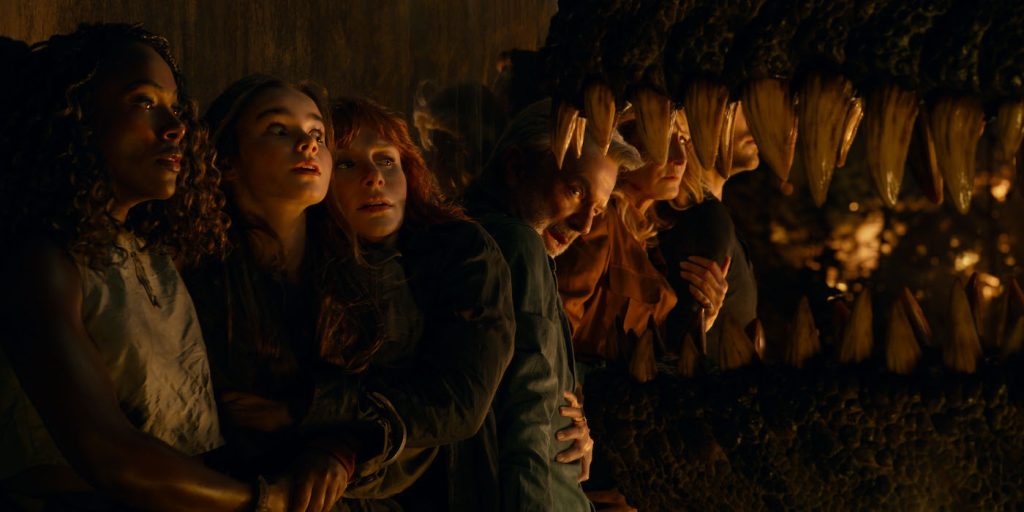
Jurassic World: Dominion brings a kind of closure to a franchise that means a lot to moviegoers. What takeaway were you going for at the end?
Colin felt very strongly that he wanted the audience to feel safe and fulfilled. He wanted to give hugs to the world in its time of need. We started writing this movie in a situation of an impending ecological crisis which was then elevated by a pandemic. So our intention with this movie is to challenge audiences to step up and join the fight. It’s an optimistic message: If we take action, we will all be okay.
For more on Jurassic World: Dominion check out these stories:
The New “Jurassic Park: Dominion” Trailer is a Rip-Roaring Good Time
New “Jurassic World: Dominion” Video Teases Franchise-Ending Epic
“Jurassic World: Dominion” Writer/Director Colin Trevorrow Teases Diabolical New Dinosaur
Featured image: (from left) A Pyroraptor, Kayla Watts (DeWanda Wise) and Owen Grady (Chris Pratt) in Jurassic World Dominion, co-written and directed by Colin Trevorrow.



